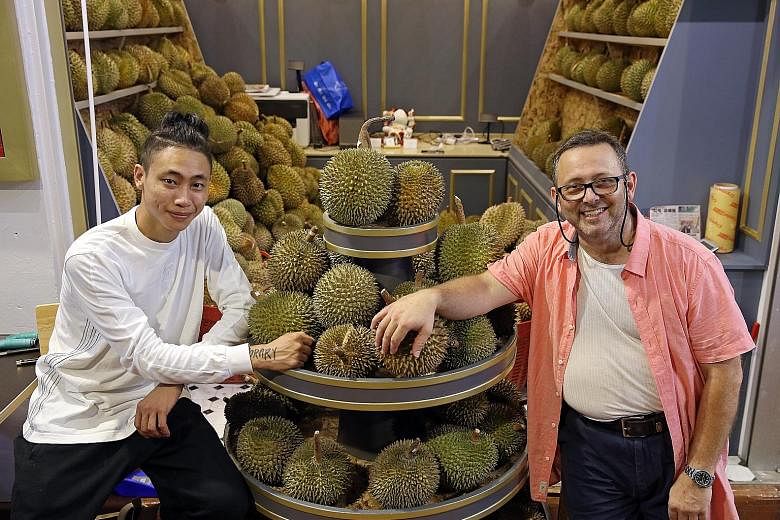"Have you ever seen a 'gwai lo' selling durians?" asks Mr Phillip George Laskaris, using the Cantonese slang for Westerner.
Even in a multiracial and multicultural society such as Singapore, Caucasians taking up uncommon jobs have raised eyebrows.
Last week, for example, a Singapore citizen originally from South Africa made headlines for being the only Caucasian to be employed by SBS Transit as a bus captain.
But why sell durians?
Mr Laskaris, an Australian businessman, says he saw a gap in the Singapore market for good quality Thai durian and jumped at it.
The 55-year-old Greek, who grew up in Perth and shuttles between Thailand and Singapore, has teamed up with Singaporean poet and copywriter Marc Ashley, 25, to open Yu Lian, a stall in Queen Street that specialises in Thai durian.
It opened about two weeks ago and brings in the fruit from southern Thailand about twice or thrice a week. They are transported by road.
The durians come from his wife Wanlee Thipkaew's family-owned plantations in the Surat Thani province near the town of Ban Song in southern Thailand, about 1,100km from Singapore.
-
Yu Lian
-
Where: Block 269 Queen Street, 01-234
Open: 5am to 1am daily, until the end of the Thai durian season which may last until early October.
Info: Call 6909-3522 or e-mail maa.baison.th@gmail.com
In a market dominated by Malaysian durian varietals from Mao Shan Wang to D24, Thai specialist Yu Lian is indeed a rarity here.
Singapore has a big appetite for Malaysian durian. Last year, Malaysia exported more than 19,000 tonnes of durians, mostly to Singapore, according to United Nations Commodity Trade data.
However, durians from Thailand, the world's largest durian exporter, whose main market is China, are generally less popular here.
Thai durian developed a bad rap among Singapore diners over the years, mostly because ones that had been sold here tended to be unripe, less aromatic and possibly of low grade.
But Mr Laskaris, hopes to change consumers' view of Thai durian.
"We want to revolutionise the durian market in Singapore. The perception here is that Malaysian durian is superior to Thai durian and we plan to change that."
He had initially planned to sell the Thai durians from his wife's family to wholesalers here, but penetrating the Malaysian-centric local durian market proved difficult.
A fruit supplier then advised him to open a retail store instead.
Mr Laskaris says Yu Lian's offerings are A-grade and come from mature orchards that have durian trees that are mostly between 40 and 70 years old.
The stall currently retails three Thai varieties: Kanyao, Chanee and Monthong (see other story). It had also sold the Puang Manee variety, but its season ended at the end of last month.
The Thai durian season usually lasts from April to September, but can vary, depending on the onset of the monsoon rains.
Mr Laskaris tasted his first durian in the form of a durian choux puff from Goodwood Park hotel while on holiday in Singapore 30 years ago, and was blown away by its "sublime" flavour.
The former Western rock lobster export specialist met his business partner Mr Ashley through his wife - Mr Laskaris' wife and Mr Ashley's mother used to be beauty therapist colleagues in Singapore some years ago.
Mr Laskaris and his wife, who is in her 40s, have a daughter.
The company, which has 11 shareholders, rents a stall from Mr Tang Fook Cheong, 67, who is Yu Lian's marketing director.
Mr Tang, who runs textile and curtain-making business Cheong Textile, says his business is a "sunset industry". He has been looking to diversify and sees potential in expanding the Thai durian market here.
While customers may be intrigued by Yu Lian's "ang moh" - a colloquial term for Caucasian - seller, it remains to be seen whether Thai durian will gain popularity here.
University undergraduate Wei Lynn Tan, 23, who ate Thai Monthong durian for the first time last Thursday night, was surprised by its quality.
"The durian is creamy although it feels dry when you hold it. It is sweet with a slightly bitter aftertaste," she says.
Her friend, Zachary Chia, 21, a national service man, adds: "It has a nice, custardy taste to it."
•Follow Rebecca Lynne Tan @STrebeccatan
•In celebration of National Day, Yu Lian is offering a 52 per cent discount on its durians until 11.59pm tonight.
Thai durian varieties
KANYAO
Characteristics: A soccer ball-shaped durian with smaller spikes. Smooth, golden yellow flesh, bittersweet flavour.
Price: $28 to $32 a kg
CHANEE
Characteristics: The durian has noticeably larger and broader spikes. Bright yellow flesh, creamy with a stronger and more distinct bittersweet flavour.
Price: $32 to $35 a kg
MONTHONG
Characteristics: Monthong, which means "golden pillow" in Thai, is the most well-known of the Thai varietals. The fruit has an elongated shape with sweet flesh, small seeds and a slightly fibrous texture.
Price: $25 to $28 a kg
Prices fluctuate with supply and quality. Yu Lian also receives ad-hoc supplies of small wild jungle durian, which it has coined Topaz durian. It is characterised by close long spikes and a deep-orange flesh that smells like cognac.


